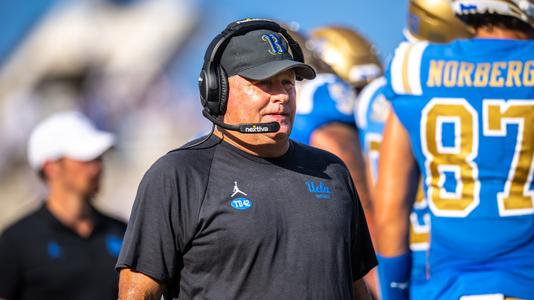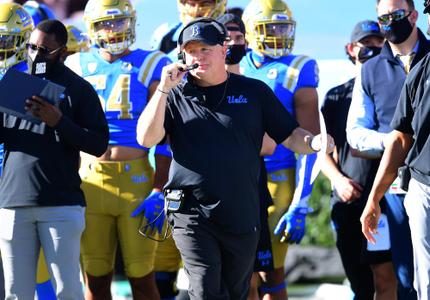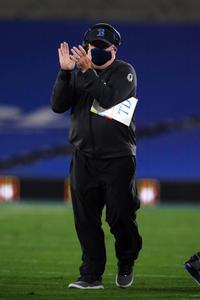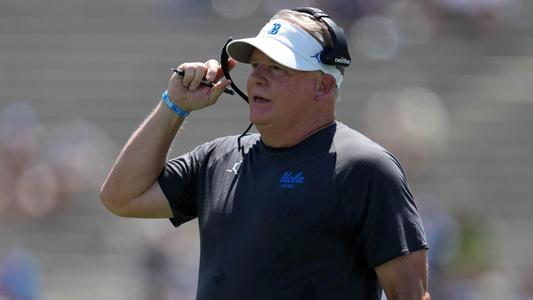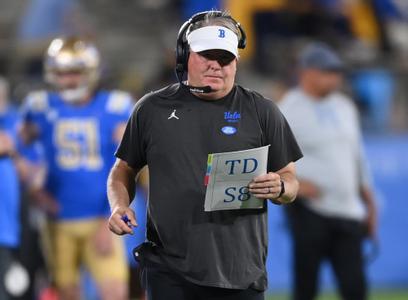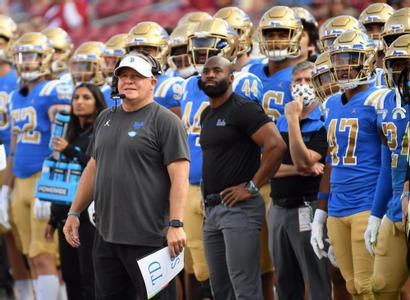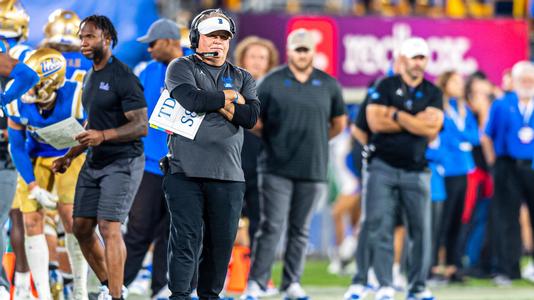Football
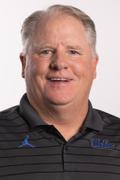
- Title:
- Head Coach
Chip Kelly was named UCLA’s 17th head football coach on Nov. 25, 2017. Kelly holds over 30 seasons of coaching experience at both the professional and collegiate levels, most recently serving as head coach of the San Francisco 49ers (2016) prior to coming to Westwood. He also worked as the head coach of the Philadelphia Eagles (2013-15) following four seasons as head coach at the University of Oregon (2009-12) where he posted a record of 46-7. At each stop, Kelly has been the guiding force for some of the most productive offenses in the game, including seven seasons with NCAA top-25 ranked scoring offenses and eight with NCAA top-25 rushing offenses.
In 2023, the Bruins secured their eighth win of the season in the LA Bowl which earned a spot for Kelly alongside Red Sanders (1952-55), Terry Donahue (1984-88) and Jim Mora (2012-15) as the only UCLA head coaches to have produced at least eight wins over three straight seasons. The defense ranked 10th in the nation giving up 301.5 yards per game. UCLA was second the nation in rushing defense (80.8 yards per game) and rated fifth nationally in sacks per game. Laiatu Latu, a consensus All-America selection, led the nation in tackles for loss (1.8) and became UCLA's first-ever winner of the Lombardi Award and the Hendricks Award. The total of 24 turnovers forced rated 12th in the country. On offense, the rushing attack ranked 16th nationally (197.9). Carson Steele (847 yards) and T.J. Harden (827) led the ground attack. Logan Loya’s 59 receptions tied him for 15th on the all-time school single-season list.
In 2022, the Bruins posted nine regular season wins and advanced to play in the Tony the Tiger Sun Bowl during a record-setting season. UCLA achieved the highest total offense average in school history (503.6), a mark which rated fourth in the nation. The Bruins led the Pac-12 in rushing average for the first time since 1976 with an average of 237.2 rushing yards per game (sixth nationally). It was the third straight season in which UCLA had averaged at least 200-yards rushing per contest and the first time the program had accomplished the feat since doing so in 1987-1986-1985. Quarterback Dorian Thompson-Robinson became the school's all-time leader in TD passes, passing yards, completions and total offense during the season while finishing his Bruin career ranked among the all-time top 10 in the Pac-12 in total offense and touchdown passes. The Bruins racked up over 6,000-yards in total offense for just the fourth time in school history and set school records for most points scored (510). Zach Charbonnet led all Pac-12 players in 100-yard rushing games (8) and owned the best per game-average at 135.9 yards per game in the league. He also led the nation in all-purpose yardage with an average of 168.0. The Bruin team finished the season with a national ranking (21st) in the polls for the first time since 2014. Charbonnet, Thompson-Robinson and offensive linemen Jon Gaines II and Atonio Mafi were selected in the 2023 NFL Draft.
The 2021 season saw the Bruins record the program's most wins since 2015, at 8-4, finish tied for second in the Pac-12 South with a 6-3 conference mark and earn a bid to the San Diego Credit Union Holiday Bowl. UCLA paced the Pac-12 in scoring at 36.5 points per game to rank 12th nationally. The Bruin rushing attack averaged 215.1 yards per contest to rate as the 14th-best unit in the NCAA. On the other side of the ball, the run defense rated second in the Pac-12 and 23rd nationally at 124.2 yards per game and UCLA ranked second in the conference in sacks. Kyle Philips moved up among the top-5 at UCLA in career receptions after grabbing a Pac-12 best 10 scoring passes. Charbonnet led all Pac-12 running backs with seven 100-yard games during the year. Brittain Brown topped conference rushers with a 6.03 yards per carry mark. Thompson-Robinson ranked No. 1 in the league in passing efficiency (153.9). Tight end Greg Dulcich was a semifinalist for the John Mackey Award as the nation's top performer at his position. His 117-yard performance versus LSU marked the eighth straight season in which a Bruin tight end reached the century receiving yards mark in a game. UCLA topped the nation in punt return average (20.0) and was seventh in kickoff return average (27.4). Offensive lineman Sean Rhyan, defensive lineman Otito Ogbonnia and defensive back Quentin Lake joined Brown, Dulcich and Philips as selections in the NFL Draft.
In 2020, the Bruins led the Pac-12 in scoring (248 pts) and touchdowns scored (31). Thompson-Robinson produced the school's best pass efficiency mark since 2005 (156.29) and became the first Bruin quarterback to record a 300-yard passing (303) and 100-yard rushing game (109) in the same contest (at Colorado). UCLA produced a team rushing average of over 200 yards per game for just the fourth time since 1990. The mark of 230.6 rushing yards per contest ranked 12th nationally. A Bruin team had not finished with a rushing yards per carry mark greater than 2020's 5.1 mark since 1976. Dulcich rated No. 2 among the nation's tight ends with both his 73.9 receiving yards per game average and 19.88 yards per catch mark. Demetric Felton Jr. led the Pac-12 and ranked sixth in the NCAA in all-purpose yards (165.83). UCLA's defense showed improvement in all phases. The unit allowed almost 50 yards less in total offense (409.9) than the previous season, while reducing its rush defense average by almost 10 yards per game (135.7). It sliced almost half a yard off the rushing average per carry to 3.6, a mark which led the Pac-12. Per game averages for tackles for loss (6.8) and sacks (3.3-ranked 8th in NCAA) both went up.
In year two at UCLA, Thompson-Robinson finished among the top 10 at the school for a single season in completions (216-9th), total offense (2,899-10th) and touchdown passes (21-10th). He set a school mark with 564 yards of total offense in a win at Washington State while leading the second-largest comeback in school history (32 points). Running back Joshua Kelley became the eighth Bruin to post back-to-back 1,000-yard seasons. Kelley finished second in the Pac-12 in rushing yards per game average. Felton set a school mark for a running back with 55 receptions and added a school-record four scoring plays of 75-yards or more. UCLA produced five straight 200-yard rushing games for the first time since the 1978 season. Philips finished with the most catches ever by a Bruin freshman player and became the first redshirt freshman to lead the team in receptions since 2001. His 60 catches tied for 11th on the all-time school single season list and his total of two 10-plus catch games ranks third on the all-time school list. Five wide receivers made their first career scoring catches during the season. The rush defense knocked off almost 0.5 yard/carry from the average of the previous season and the number of quarterback sacks increased from 11 to 26 over a year's time. Special teams improved across the board and featured a punt and kickoff return for a touchdown. UCLA ranked second in the nation in punt return average (22.5 yards).
In his first season in Westwood, Kelly became just the fourth Bruin head coach to guide his team past USC in his initial meeting with the crosstown rival. Running back Joshua Kelley racked up 289 rushing yards in the win against the Trojans, most ever by a back in the series. Kelley finished ninth in the nation in rushing average (113.0 yds per game) and 18th nationally in all-purpose yards (130.55). It marked the fifth consecutive season in which Coach Kelly had produced an NCAA top-10 rated rushing offense leader as a college head coach. A young Bruin team which saw a school-record 21 true freshmen student-athletes take the field during the season, showed steady improvement and generated 432.9 yards of total offense per game over the last eight contests of the season, including a 528-yard effort in the season-finale versus Stanford.
Kelly’s lone season in San Francisco saw the 49ers improve from the league’s 21st-ranked rushing attack in 2015 (1,544 yards) to the 4th-best ground game in 2016 (2,019 yards). Running back Carlos Hyde was the biggest beneficiary of the improvement, gaining 988 yards in just 13 contests (76.0 yards per game).
Over Kelly’s three seasons in Philadelphia, the Eagles ranked third in the NFL in points per game (26.9) and total offense (392.8 yards per game), as well as fourth in rushing yards per game (131.3). Sixteen Pro Bowlers were selected from his teams, including eight in 2014. The Eagles won 10 games in each of his first two seasons, as his 2014 offense scored a franchise-record 474 points to surpass his 2013 team’s previous-record total of 442.
The Eagles showed a marked improvement in Year 1 under Kelly, as their 10 wins followed a four-win 2012. He became just the second head coach in league history to win a division title in his first season in the NFL, as the Eagles captured an NFC East Division Championship. He was also named the Maxwell Club NFL Coach of the Year.
Kelly began his head coaching career at the University of Oregon in 2009, leading the Ducks to a 10-3 record and a trip to the Rose Bowl. He finished his time at Oregon with an overall record of 46-7 as head coach (2009-12), including a 33-3 mark in conference play. In his four seasons in Eugene, the Ducks averaged 44.7 points per game. Kelly became the first coach in school history to guide the program to three consecutive undisputed conference championships (2009-11) and its first three 12-win seasons (2010-12).
Oregon made an appearance in a BCS Bowl game in each of Kelly's four seasons, including a trip to the National Championship game following the 2010 campaign. Kelly was named the Pac-10 Coach of the Year in back-to-back seasons in 2009 and 2010, and Associated Press Coach of the Year in 2010.
The 2012 Ducks finished second in the nation in scoring (49.6 points per game) and fifth in total offense (537.4 yards per game) with freshman quarterback Marcus Mariota under center. They would conclude the season with a Fiesta Bowl victory over Kansas State. A January bowl game was also the end result for Oregon the year prior, as the Ducks defeated Wisconsin in a Rose Bowl thriller, 45-38. Kelly’s offense notched Top-5 finishes in points per game (46.1, third) and total offense (522.8 yards per game, fourth) in 2011.
In 2010, the Ducks led the nation both points per game (46.1) and total yardage (530.7 per game) en route to a BCS National Championship Game appearance. In addition to his Pac-10 Coach of the Year and Associated Press Coach of the Year awards, Kelly garnered Eddie Robinson Coach of the Year, Walter Camp Coach of the Year, The Sporting News Coach of the Year and American Football Coaches Association (AFCA) Coach of the Year accolades.
Kelly’s first season as a head coach (2009) culminated in a Rose Bowl appearance and the Pac-10 Coach of the Year award, as his offense ranked sixth in the country in both points per game (36.1) and rushing yards per game (231.7). He was promoted to the top spot after his offenses led the Pac-10 in a number of categories during his two seasons (2007-08) as offensive coordinator under Mike Bellotti.
Kelly had spent the previous 13 years at his alma mater, the University of New Hampshire, before being named offensive coordinator at Oregon.
As offensive coordinator at UNH, Kelly protégée Ricky Santos earned the Walter Payton Award as the most outstanding player in FCS in 2006. The quarterback previously finished second in 2005. Kelly also coached the Wildcats’ offensive line (1997, 1998) and running backs (1992, 1994-96). The New Hampshire offense averaged better than 400 yards of total offense per game in seven of his eight seasons on staff.
Kelly began his coaching career guiding defensive backs and special teams at Columbia University in 1990. He moved to outside linebackers and safeties in 1991 before his first stint at UNH as running backs coach in 1992. He also spent one season at Johns Hopkins University as defensive coordinator in 1993.
